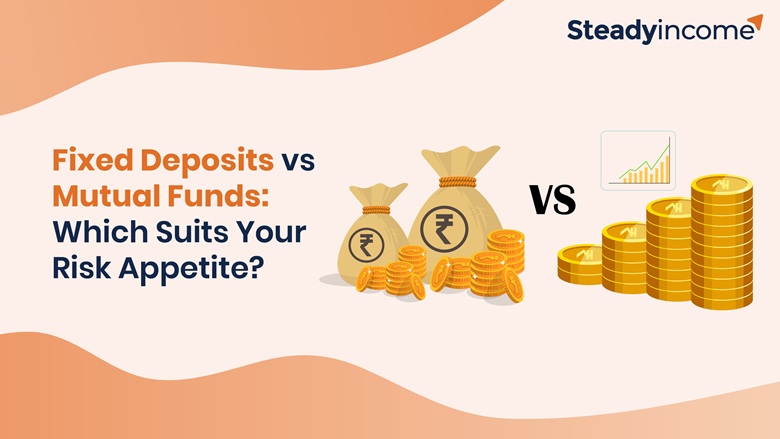Fixed Deposits vs Mutual Funds: Which Suits Your Risk Appetite?

When it comes to investing your hard-earned money, choosing the right financial instrument can often feel like navigating a maze. At Steadyincome, we understand that every investor has a unique risk appetite and financial goal. Two of the most popular investment options in India, Fixed Deposits (FDs) and Mutual Funds, offer very different risk-return profiles and benefits. Understanding these differences can help you decide which suits your financial needs better.
Here, we will explore the key features, benefits, risks, and ideal investor profiles for Fixed Deposits and Mutual Funds, helping you make an informed decision.
What Are Fixed Deposits?
Fixed Deposits are one of the safest and most traditional forms of investment in India. Fixed Deposits (FDs), primarily offered by banks and non-banking financial companies (NBFCs), allow you to spend a lump sum amount for a certain tenure at a fixed interest rate, ensuring stable returns.
Key Features of Fixed Deposits:
-
- Steady Returns: Offers a fixed interest rate that remains unaffected by market fluctuations, ensuring predictable returns.
- Low Risk: Capital is generally safe, backed by the financial institution.
- Fixed Tenure: Ranging from a few months to 10 years or more.
- Liquidity: Premature withdrawal is possible but may involve penalties.
- Taxation: Interest income is subject to tax according to your applicable income tax slab, and TDS (Tax Deducted at Source) may be applicable if the interest earned exceeds the prescribed threshold.
What Are Mutual Funds?
Mutual Funds aggregate capital from a group of investors and use it to build a diversified portfolio of assets such as stocks, bonds, and other securities, aiming to provide returns based on market performance. They are managed by professional fund managers aiming to maximize returns based on the fund's investment objective.
Key Features of Mutual Funds:
-
- Potential for Higher Returns: Subject to market performance.
- Variety of Schemes: Equity, debt, hybrid, and more.
- Liquidity: Typically, units can be redeemed on any business day.
- Risk Level: Depends on the fund type; equity funds are riskier than debt funds.
- Taxation: Gains are subject to capital gains tax with varying rates. However, ELSS (equity-linked savings scheme) funds qualify for tax deductions under Section 80C of the Income Tax Act.
Fixed Deposits vs Mutual Funds: Risk Appetite and Returns
Risk Profile
-
- Fixed Deposits: Suited for conservative investors who prioritize capital preservation and want predictable returns. They are ideal for people nearing retirement or those who cannot tolerate market volatility.
- Mutual Funds: Suitable for moderate to aggressive investors willing to take market risks in exchange for higher returns. Equity mutual funds can be volatile but offer the potential for wealth creation over the long term.
Returns
-
- Fixed Deposits: Offer fixed but relatively lower returns, typically in the range of 5% to 7% annually, depending on the bank and tenure.
- Mutual Funds: Equity mutual funds have historically delivered returns between 10% to 15% over the long term, although these are not guaranteed. Debt mutual funds offer returns higher compared to traditional savings schemes but lower than equity funds.
Who Should Invest in Fixed Deposits?
-
- Individuals with low risk tolerance.
- Senior citizens are looking for a regular income.
- Investors with short-term financial goals.
- Individuals who prefer capital protection over returns.
Who Should Invest in Mutual Funds?
-
- Investors with a moderate to high-risk appetite.
- Young professionals are aiming for long-term wealth creation.
- Those looking for diversification in their portfolio.
- Investors who are comfortable with market fluctuations and periodic investments.
Taxation Matters: A Closer Look
Tax implications can significantly affect your net returns.
-
- Fixed Deposits: Interest earned is taxable as per your income slab. Banks deduct Tax Deducted at Source (TDS) if interest exceeds a threshold.
- Mutual Funds: Equity mutual funds qualify for long-term capital gains tax exemption up to ₹1 lakh annually, with gains taxed at 10%. Debt funds attract long-term capital gains tax at 20% with indexation benefits.
Align Your Investment with Your Financial Goals
At Steadyincome, we emphasize that the right investment depends on your financial goals, investment horizon, and risk appetite. While Fixed Deposits provide peace of mind with assured returns, Mutual Funds can help you build wealth if you can tolerate market volatility.
Diversification is Key
A balanced portfolio often includes both Fixed Deposits and Mutual Funds to manage risk and enhance returns. For example:
-
- Allocate a portion of your savings to FDs for capital safety.
- Invest in equity mutual funds for growth over 5-10 years.
- Use debt mutual funds as a middle ground offering moderate risk and returns.
How to Get Started?
-
- Assess your risk appetite: Use online risk assessment tools or consult a financial advisor.
- Define your financial goals: Short-term vs long-term, income vs growth.
- Choose the right investment mix: Select an optimal investment mix tailored to your risk appetite, investment horizon, and return expectations.
- Monitor and review: Regularly track your investments and rebalance if needed.
Final Thoughts
Choosing between Fixed Deposits and Mutual Funds is not a matter of which is better, but which suits your risk appetite and financial goals. Fixed Deposits are ideal for safety and certainty, while Mutual Funds offer a gateway to higher returns through market exposure.
To make smarter investment decisions, stay informed and consider professional advice when needed. Explore more resources and investment options at Steadyincome and take control of your financial future today.


